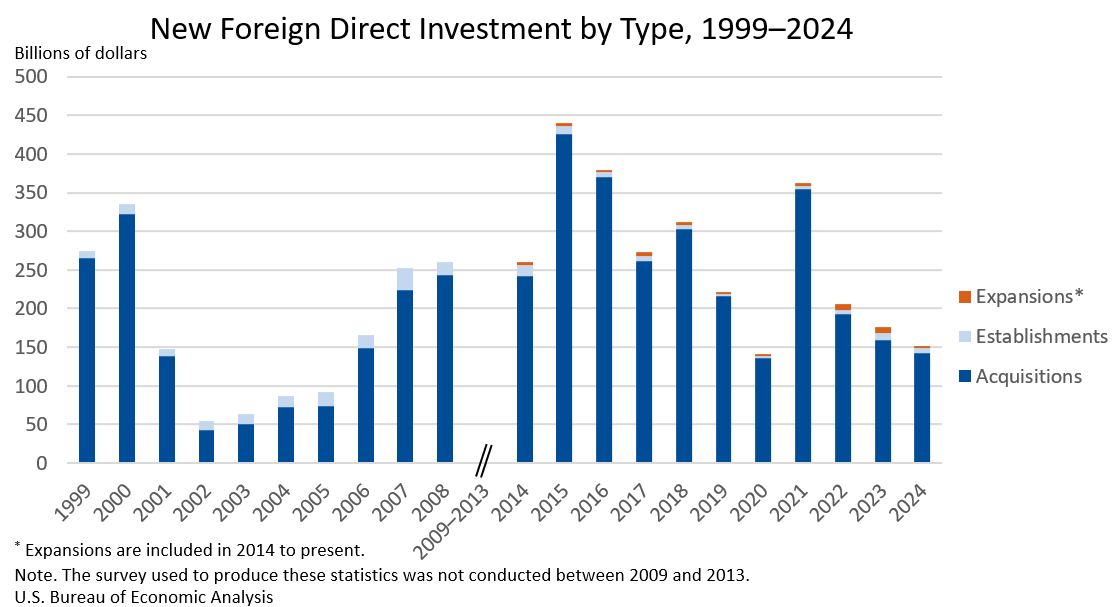Bureau of Economic Analysis
New Foreign Direct Investment in the United States, 2024
Expenditures by foreign direct investors to acquire, establish, or expand U.S. businesses totaled $151.0 billion in 2024, according to preliminary statistics released today by the U.S. Bureau of Economic Analysis. Expenditures decreased $24.9 billion, or 14.2 percent, from $176.0 billion (revised) in 2023 and were below the annual average of $277.2 billion for 2014–2023. As in previous years, acquisitions of existing U.S. businesses accounted for most of the expenditures.
Principal Federal Economic Indicators
Noteworthy
- 2025 News Release Schedule
- Innovation at BEA
- 2025 Annual Updates
- New! Services Trade Data for More Countries
- Data Tool: Trade in Value Added
- Distribution of State Personal Income
- Updated: RIMS II Regional Multipliers
- Arts and Culture
- Space Economy
- FDI Now in State BEARFACTS
- Quick Guide: Price Indexes
The Latest
Gross Domestic Product by State, 4th quarter 2016 and annual 2016
Real gross domestic product (GDP) increased in every state and the District of Columbia in the fourth quarter of 2016. Real GDP by state growth ranged from 3.4 percent in Texas to 0.1 percent in Kansas and Mississippi.
March 2017 Trade Gap is $43.7 Billion
The U.S. monthly international trade deficit decreased in March 2017 according to the U.S. Bureau of Economic Analysis and the U.S. Census Bureau. The deficit decreased from $43.8 billion in February (revised) to $43.7 billion in March, as imports decreased more than exports. The previously published February deficit was $43.6 billion. The goods deficit increased $0.4 billion in March to $65.5 billion. The services surplus increased $0.4…
U.S. International Trade in Goods and Services, March 2017
The U.S. Census Bureau and the U.S. Bureau of Economic Analysis, through the Department of Commerce, announced today that the goods and services deficit was $43.7 billion in March, down $0.1 billion from $43.8 billion in February, revised. March exports were $191.0 billion, $1.7 billion less than February exports. March imports were $234.7 billion, $1.7 billion less than February imports.
Real Consumer Spending Rises in March
Personal income increased 0.2 percent in March after increasing 0.3 percent in February. Wages and salaries, the largest component of personal income, increased 0.1 percent in March after increasing 0.5 percent in February.
Personal Income and Outlays, March 2017
Personal income increased $40.0 billion (0.2 percent) in March according to estimates released today by the Bureau of Economic Analysis. Disposable personal income (DPI) increased $35.0 billion (0.2 percent) and personal consumption expenditures (PCE) increased $5.7 billion (less than 0.1 percent). Real DPI increased 0.5 percent in March and Real PCE increased 0.3 percent. The PCE price index decreased 0.2 percent.
GDP Increases in First Quarter
Real gross domestic product (GDP) increased 0.7 percent in the first quarter of 2017, according to the “advance” estimate released by the Bureau of Economic Analysis. In the fourth quarter of 2016, real GDP increased 2.1 percent.
Gross Domestic Product, 1st quarter 2017 (advance estimate)
Real gross domestic product (GDP) increased at an annual rate of 0.7 percent in the first quarter of 2017 (table 1), according to the "advance" estimate released by the Bureau of Economic Analysis. In the fourth quarter of 2016, real GDP increased 2.1 percent.
New Data Project: Measuring the Economic Impact of Outdoor Recreation
We Want to Hear from You
Members of the public, private industry, state and local governments, non-profit organizations, and other interested parties are invited to provide feedback on the development of a new set of statistics that will provide information on economic activity associated with the outdoor recreation segment of the United States economy.
Finance and Insurance Led Growth in the Fourth Quarter
Finance and insurance; retail trade; and professional, scientific, and technical services were the leading contributors to the increase in U.S. economic growth in the fourth quarter of 2016. Overall, 19 of 22 industry groups contributed to the 2.1 percent increase in real GDP in the fourth quarter.
Gross Domestic Product by Industry, 4th quarter 2016
Finance and insurance; retail trade; and professional, scientific, and technical services were the leading contributors to the increase in U.S. economic growth in the fourth quarter of 2016. According to gross domestic product (GDP) by industry statistics released by the Bureau of Economic Analysis, 19 of 22 industry groups contributed to the overall 2.1 percent increase in real GDP in the fourth quarter.




